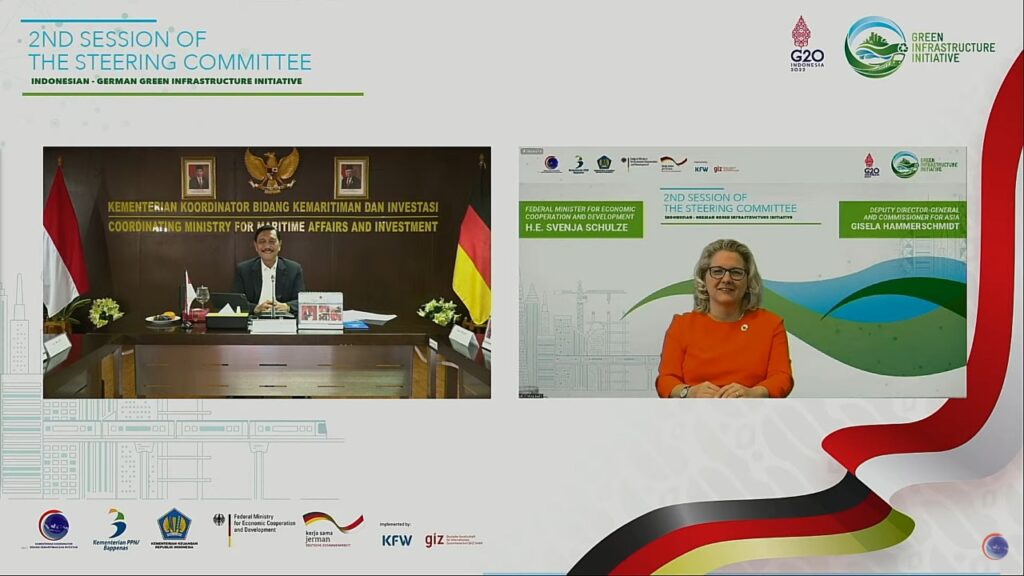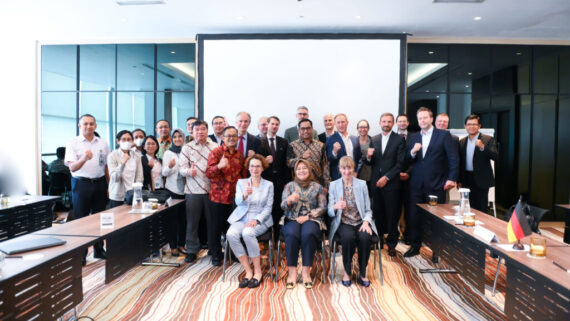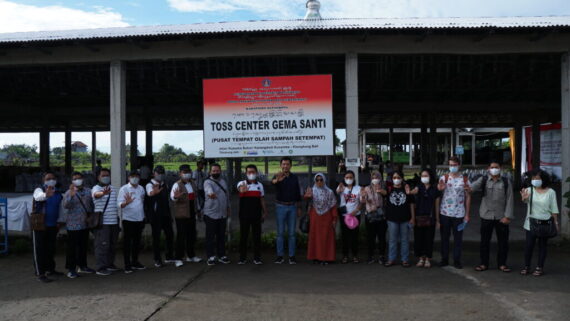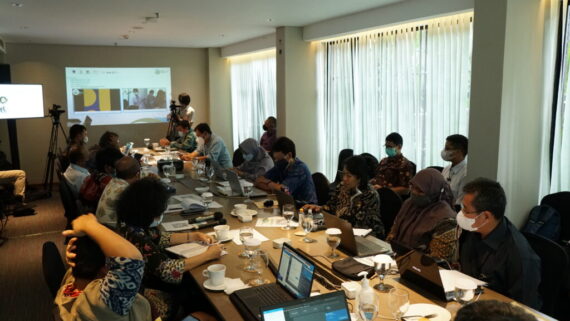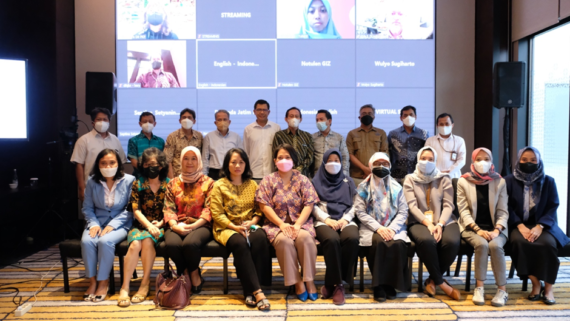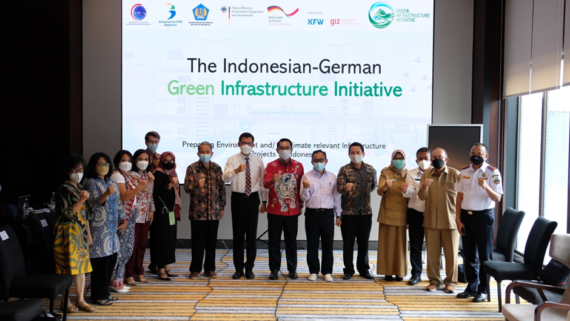Indonesia – Germany Inaugurate Pre-Feasibility Studies of 15 Projects and 2 New Provinces of GII
The Republic of Indonesia together with the Federal Republic of Germany (Indonesia – Germany) inaugurated the start of the initial feasibility study of 15 project proposals for the Green Infrastructure Initiative (GII). This was conveyed at GII’s 2nd Steering Committee Session led by Coordinating Minister for Maritime Affairs and Investment (Menko Marves) Luhut B. Pandjaitan and Minister of Economic Cooperation and Development Svenja Schulze, Thursday (10-02-2022).
In his opening remarks, Coordinating Minister Luhut explained that GII is an innovative way to accelerate and prioritize infrastructure projects related to the environment and climate. The GII 2nd Steering Committee Session event itself is a continuation of the first session as well as the inauguration of the GII which was held in March 2021.
“Indonesia is open to investment and technology transfer, especially related to green investment. Our people deserve clean water and air, and we strive to provide them for the next generation and the global community. GII will be the way to make it happen,” said Coordinating Minister Luhut, Thursday (10-02-2022).
Adding Coordinating Minister Luhut, Minister Svenja said that a climate-friendly future in livable cities for everyone can only be achieved if we have a circular economy and sustainable waste management, improve climate-friendly transportation, and build water and water management systems. Environmentally friendly and resource friendly waste. These things require a significant investment.
“This good response shows that this initiative is the right approach to implement Indonesia’s national and local priorities in tackling climate change and environmental degradation,” said Minister Svenja.
On this occasion, members of the steering committee passed several resolutions that would form the foundation for the next GII journey, with one of them being the inauguration of 15 proposals from four provinces (West Java, Central Java, East Java, Bali) for an initial feasibility study to be carried out. The 15 project proposals consist of the Solid Waste Management, Water and Wastewater Management, and Urban Public Transportation sectors. These three sectors are the three sectors that are the focus of GII, with one of the proposed projects being the Integrated Citarum Wastewater Management, which is part of the ‘Citarum Harum’ program and one of the National Strategic Projects.
Apart from Citarum, several other proposed projects are Low Carbon Tourism Destination Development: Nusa Penida Islands, Surabaya Regional Railway Line – 2nd Phase East Java, Regional TPA (Northern central Java) and TPST Regional Magelang and Borobudur Central Java. The Sarbagita Regional Sanitary Landfill (TPA) is also a proposed project for GII in dealing with waste in the Sarbagita area which has become the state’s concern.
In addition to project approval, two provinces were also approved as provinces that would implement GII, namely Special Region of Yogyakarta and East Nusa Tenggara Province. Both are provinces that are committed to carrying out sustainable infrastructure by being part of the GII.
“The participation of the Special Region of Yogyakarta Government is a form of effort and commitment to our long-term development goal, which is to realize the Special Region of Yogyakarta by 2025 as a Center for Education, Culture and Leading Tourism Destinations in Southeast Asia in a developed, independent and prosperous society,” said the Governor of DIY Sri Sultan Hamengkubuwono X when expressing his gratitude for the ratification of DI Yogyakarta as part of GII, as well as conveying his commitment to the implementation of this initiative.
The Head of Regional Planning and Development Agency (BAPPEDA) for the Province of East Nusa Tenggara, representing the Governor of NTT expressed his respect and pride in being selected as a partner following four other provinces to be involved in the Green Infrastructure Initiative Strategic Program as an integrated effort to reduce global warming and reduce the effects of extreme climate change. He revealed that the NTT Provincial Government believes that this Green Infrastructure Initiative is through the Waste Management, Clean Water and Wastewater Management Program in Kupang City, which is the capital city of NTT Province, in Labuan Bajo which is one of the five National Super Priority Tourist Destinations and Waingapu which is a national tourism destination. The capital city of East Sumba is an innovative way to accelerate and prioritize infrastructure projects that are relevant to the environment and climate.
On this occasion also members of the Steering Committee conveyed the progress of the GII over the last six months since the first GII Steering Committee session as well as an overview of the implementation of the GII in 2022 which was presented by the Deputy Director General and Commissioner for Asia, Ministry of Economic Cooperation and Development of the Federal Republic of Germany, Gisela Hammerschmidt.
Various institutions involved in GII’s operation also provide support for the implementation of GII in the future. This was conveyed by the Minister of PUPR Basuki Hadimuljono, Minister of Transportation Budi Karya Sumadi, and the Chief Executive of the Committee for the Acceleration of Priority Infrastructure Handling (KPPIP) during the event.
In closing, the Deputy for Coordination of Environmental and Forestry Management at the Coordinating Ministry for Maritime Affairs, Nani Hendiarti, expressed her appreciation for the commitment of the four provinces in the preparation of project proposals and hopes for the smooth journey of this latest initiative in the future.
“It’s inspiring when we can work together on such a big initiative like this. I am pleased to see that the GII project proposal shows a clear commitment and can achieve the goal of reducing greenhouse gas emissions, and improving the environment around us,” said Deputy Nani.
It is known that GII is the latest strategic bilateral initiative between the Government of Indonesia and the Federal Government of Germany. The initiative was agreed in 2019 in Berlin and includes a five-year financial cooperation facility of up to EUR 2.5 Billion to support environmental and climate relevant infrastructure projects along with grant-financed technical cooperation to identify and prepare projects. A high level of coordination is achieved by a steering committee (Steering Committee) co-chaired by the Coordinating Ministry for Maritime Affairs and Investment (CMMAI) and the German Federal Ministry of Economic Cooperation and Development (BMZ).
Meanwhile, the goal of GII itself is to promote the development of infrastructure projects that are relevant to the environment and climate in three sectors: Solid Waste Management, Water and Wastewater Management, and Urban Public Transport. GII currently operates in four provinces, namely West Java, Central Java, East Java, Bali, East Nusa Tenggara, and DI Yogyakarta.
Watch the session here:
 English
English Indonesia
Indonesia
